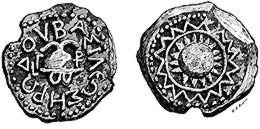Herod the Great
Herod the Great (c. 73–4 BCE) was a Roman client king of Judea, known for his substantial building projects, and his role in the biblical narrative surrounding the birth of Jesus. His reign from 37 BCE until his death in 4 BCE marked a period of significant change in the history of the Judea region, influencing the architectural, political, and cultural landscape.
Early Life[edit | edit source]
Herod was born in southern Palestine around 73 BCE, the son of Antipater the Idumaean, a high-ranking official under Hyrcanus II, a Hasmonean king. His family converted to Judaism, and Herod was raised as a Jew. His father's influence secured him a position in the government of Judea, and he quickly rose through the ranks due to his political acumen and loyalty to Rome.
Rise to Power[edit | edit source]
Herod's path to kingship was marked by his strategic political alliances and military prowess. In 40 BCE, with Judea under threat from the Parthians, Herod fled to Rome. There, he successfully persuaded the Roman Senate to name him "King of the Jews," a title that was ratified by Octavian (later Augustus) and Mark Antony. With Roman support, Herod returned to Judea and, after a three-year campaign, captured Jerusalem in 37 BCE, securing his throne.
Reign[edit | edit source]
Herod's reign was characterized by his ambitious building projects, including the expansion of the Second Temple in Jerusalem, the construction of the fortress at Masada, and the development of the port city of Caesarea Maritima. These projects not only demonstrated his power and wealth but also aimed to ingratiate him with both his Roman overlords and his Jewish subjects.
Despite these achievements, Herod's rule was also marked by paranoia and familial strife. He executed several members of his own family, including his wife Mariamne and three of his sons, out of fear of plots against his rule. His relationship with the Jewish populace was complex; while he sought to modernize Judea and bring it in line with Roman standards, his actions often alienated his subjects, particularly his heavy taxation and his introduction of Roman games and pagan symbols.
Death and Legacy[edit | edit source]
Herod died in 4 BCE after a painful and debilitating illness. His kingdom was divided among his surviving sons, as per his will and the approval of Augustus, leading to the formation of the Herodian kingdom but also to a period of instability and fragmentation in Judea.
Herod's legacy is a subject of debate among historians. He is remembered for his monumental building projects and for his role in the development of the Judean state. However, his tyrannical rule, acts of brutality, and the alienation of his subjects have also been highlighted. In Christian tradition, Herod is often remembered for the Massacre of the Innocents, an event described in the Gospel of Matthew in which Herod orders the execution of all young male children in Bethlehem to eliminate the newly born Jesus, seen as a rival king. This act, though not corroborated by other historical sources, has contributed to his lasting infamy.
Search WikiMD
Ad.Tired of being Overweight? Try W8MD's NYC physician weight loss.
Semaglutide (Ozempic / Wegovy and Tirzepatide (Mounjaro / Zepbound) available. Call 718 946 5500.
Advertise on WikiMD
|
WikiMD's Wellness Encyclopedia |
| Let Food Be Thy Medicine Medicine Thy Food - Hippocrates |
Translate this page: - East Asian
中文,
日本,
한국어,
South Asian
हिन्दी,
தமிழ்,
తెలుగు,
Urdu,
ಕನ್ನಡ,
Southeast Asian
Indonesian,
Vietnamese,
Thai,
မြန်မာဘာသာ,
বাংলা
European
español,
Deutsch,
français,
Greek,
português do Brasil,
polski,
română,
русский,
Nederlands,
norsk,
svenska,
suomi,
Italian
Middle Eastern & African
عربى,
Turkish,
Persian,
Hebrew,
Afrikaans,
isiZulu,
Kiswahili,
Other
Bulgarian,
Hungarian,
Czech,
Swedish,
മലയാളം,
मराठी,
ਪੰਜਾਬੀ,
ગુજરાતી,
Portuguese,
Ukrainian
Medical Disclaimer: WikiMD is not a substitute for professional medical advice. The information on WikiMD is provided as an information resource only, may be incorrect, outdated or misleading, and is not to be used or relied on for any diagnostic or treatment purposes. Please consult your health care provider before making any healthcare decisions or for guidance about a specific medical condition. WikiMD expressly disclaims responsibility, and shall have no liability, for any damages, loss, injury, or liability whatsoever suffered as a result of your reliance on the information contained in this site. By visiting this site you agree to the foregoing terms and conditions, which may from time to time be changed or supplemented by WikiMD. If you do not agree to the foregoing terms and conditions, you should not enter or use this site. See full disclaimer.
Credits:Most images are courtesy of Wikimedia commons, and templates, categories Wikipedia, licensed under CC BY SA or similar.
Contributors: Prab R. Tumpati, MD





